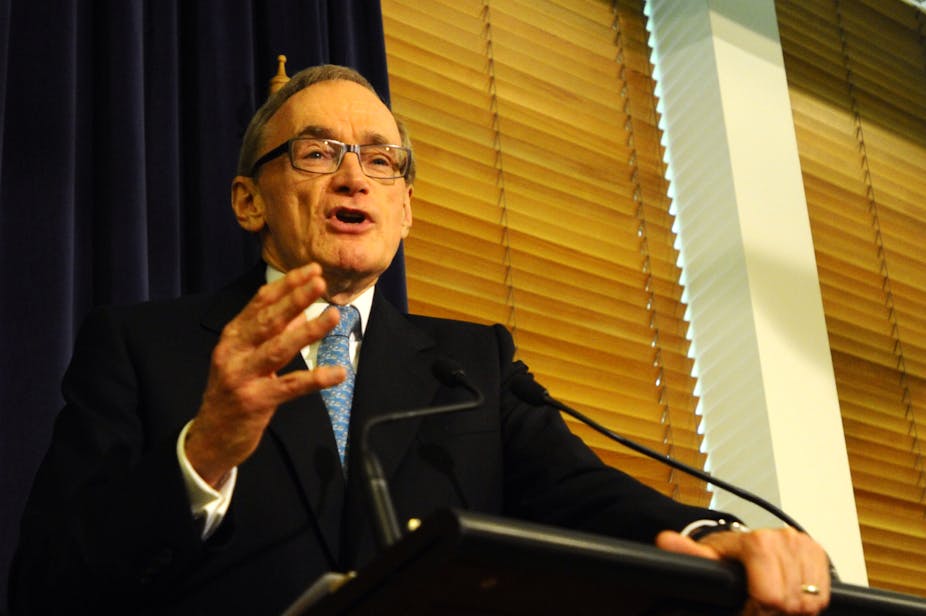Former foreign minister Bob Carr has delivered a strong critique of the former Labor government, in announcing his much-anticipated departure from the Senate after only 18 months.
Carr, whose criticisms embraced both the first Rudd government and the Gillard government, said Labor had lacked caution, cunning and canniness.
It should have taken a different approach on carbon pricing; it had dismantled too much of the Howard government’s asylum seeker policy, and its failed media changes had been “badly wrongheaded”.
“I was struck by a lack of canniness in the government. A lack of caution, cunning - canniness is probably the best word,” he told a news conference. “With carbon trading, for example, I thought there was a different model available in the first years of the government.” That would have been based on the NSW GGAS scheme, which applied to the output of the power sector.
On people smuggling, “I thought the government was too ready to cater to one section of opinion in Australia and dismantle what Howard had left in place, without weighing carefully, cannily what effect that might have on people smuggler activity.”
Carr advised Labor to stick by the PNG solution on asylum seekers introduced just before the election, which the Abbott government has taken over. “There may be a temptation from time to time to criticise the Abbott government from what might be described as the left on this issue. That is a temptation best resisted.”
He had concluded the Gillard government had “lost its way” when at a March cabinet meeting convened to discuss coal seam gas, “there was a big package of media reforms dropped on the table”.
“This was tearing up the [former NSW premier] Neville Wran playbook for getting re-elected. To embark on a row with the media in the six month countdown to a general election was a radical recasting of all the rules I’d learnt at knees of a master.”
In an election countdown “you’re friends with everyone and you’re cooling, not igniting, controversies,” he said.
“I thought a certain political direction had been cast out the window.”
He had personally missed the cabinet discussion on the media plan – if he had known that would be the topic “I most certainly would’ve been there”.
He agreed that his decision to desert Gillard - who had recruited him to the Senate and the foreign ministry - to vote for Kevin Rudd’s return, was based on pragmatism. The polls had shown Labor was threatened with being reduced to a vote from which it would be very hard to recover. “There’s a big difference between 33% of the vote and getting 27%” or lower, he said.
Carr said something had to be done to reform the Senate voting system, in the wake of the success of micro parties at the election. Proportion representation worked in different ways “but to see it work to give over-representation to pocket handkerchief political effusions is pretty strange”.
“Not that this is the test in these matters, but explaining to an interested observer from overseas that a party dedicated to outdoor vehicle recreation is now represented on the floor of the Australian Senate that will be charged with looking at those awesomely important questions, the level and nature of government expenditure, the extent to which you price carbon, if at all … there is something wrong.”
Carr said he had voted for Bill Shorten who gave Labor the best chance of returning to power in one term, although this would be hard.
Despite being just elected for a six-year Senate term, an unabashed Carr said it would be wrong for him to be “hogging” a shadow ministry. He praised the flexibility of the US system where an outsider could come into a position and then leave after four years.
He dismissed his previous comments that he intended to stay in the Senate as reflecting “irrational exuberance”. “I was very high spirited about taking this job but my enthusiasm probably got ahead of a more calculated approach.”
If the government had been re-elected he would have served at least another three years, he said. Creating a casual Senate vacancy did not cost the taxpayer anything. (There is no byelection involved.)
The NSW Labor party is expected to nominate Deb O'Neill, who lost the seat of Robertson in the election, to replace Carr.
Carr said he planned to “reinvent myself as a specialist in Asia”.

